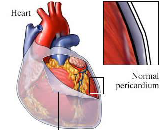Cardiopericarditis (CP)
Pericarditis

Pericarditis is an inflammation of the pericardium. A characteristic chest pain is often present. The disease can be acute or chronic. The causes of pericarditis is most often due to a viral infection. Other causes include bacterial infections such as tuberculosis, uremic pericarditis, after a heart attack, cancer, and chest trauma. It may also occur due to an unknown cause.Diagnosis is made based on the chest pain, a pericardial rub, specific ECG changes, and fluid around the heart.
Model for pericarditis is used to test the hypothesis that when activation of Bachmann's bundle (BB) is critical to the unstable reentrant circuits that maintain atrial fibrillation (AF). Chronic atrial fibrillation (AF) is thought to be due to multiple, simultaneously circulating wavelets. Model for pericarditis contains "A rabbit model for constrictive pericarditis without thoracotomy" and "An animal model for purulent pericarditis".
Organism species: Mus musculus (Mouse)
- Customized Service n/a Model for Cardiopericarditis (CP) Disease Model Customized Service Offer
- Customized Service n/a Tissue of Cardiopericarditis (CP) (If Necessary) Tissue Customized Service Offer
- Customized Service n/a Serums of Cardiopericarditis (CP) (If Necessary) Serums Customized Service Offer
Organism species: Rattus norvegicus (Rat)
- Customized Service n/a Model for Cardiopericarditis (CP) Disease Model Customized Service Offer
- Customized Service n/a Tissue of Cardiopericarditis (CP) (If Necessary) Tissue Customized Service Offer
- Customized Service n/a Serums of Cardiopericarditis (CP) (If Necessary) Serums Customized Service Offer
Organism species: Oryctolagus cuniculus (Rabbit)
- Disease model DSI503Rb01 Rabbit Model for Cardiopericarditis (CP) In Stock
- Disease model DSI503Rb02 Rabbit Model for Cardiopericarditis (CP) In Stock
- Customized Service n/a Tissue of Cardiopericarditis (CP) (If Necessary) Tissue Customized Service Offer
- Customized Service n/a Serums of Cardiopericarditis (CP) (If Necessary) Serums Customized Service Offer
Organism species: Canis familiaris; Canine (Dog)
- Customized Service n/a Model for Cardiopericarditis (CP) Disease Model Customized Service Offer
- Customized Service n/a Tissue of Cardiopericarditis (CP) (If Necessary) Tissue Customized Service Offer
- Customized Service n/a Serums of Cardiopericarditis (CP) (If Necessary) Serums Customized Service Offer


